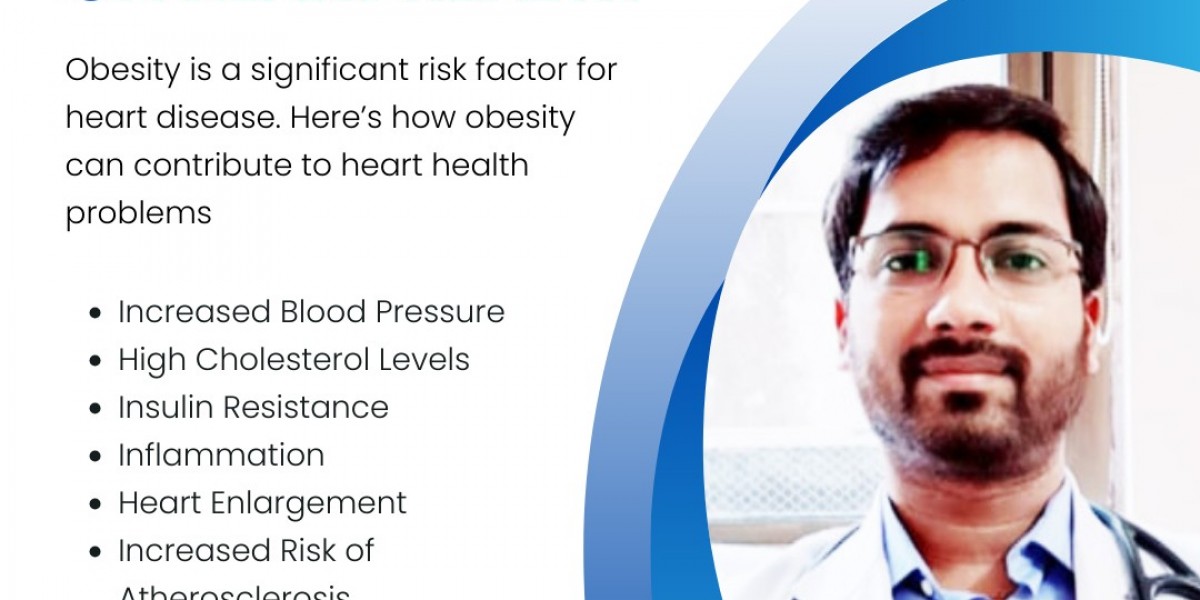Obesity is a growing concern worldwide, with significant implications for overall health, particularly cardiovascular health. As a leading factor contributing to heart disease, obesity can have a profound impact on the heart and blood vessels. Dr. Md. Farhan Shikoh, MBBS, MD (Medicine), DM (Cardiology), recognized as the Best Cardiologist in Ranchi, explains the connection between obesity and heart disease, shedding light on the mechanisms at play and offering guidance on how to manage and prevent these health issues.
Understanding Obesity
Obesity is defined by an excessive accumulation of body fat, which can be measured using the Body Mass Index (BMI). A BMI of 30 or higher is classified as obese. This condition is not just a cosmetic concern but a serious health issue that can lead to various chronic diseases, including heart disease.
The Link Between Obesity and Heart Disease
- Increased Blood Pressure
Obesity often leads to hypertension (high blood pressure), a critical risk factor for heart disease. Excess body fat, especially around the abdomen, can lead to increased arterial stiffness and resistance. This means the heart must work harder to pump blood, leading to elevated blood pressure. Over time, this additional strain can damage blood vessels and contribute to the development of heart disease.
- Elevated Cholesterol Levels
Obesity is closely linked to dyslipidemia, which involves abnormal levels of lipids in the blood. Specifically, obesity can increase levels of low-density lipoprotein (LDL) cholesterol, often referred to as "bad" cholesterol, and decrease levels of high-density lipoprotein (HDL) cholesterol, known as "good" cholesterol. High LDL levels contribute to the formation of plaque in the arteries, leading to atherosclerosis, which can eventually result in heart disease.
- Insulin Resistance and Diabetes
Obesity is a significant risk factor for type 2 diabetes, a condition characterized by insulin resistance. Insulin resistance occurs when the body's cells do not respond effectively to insulin, leading to elevated blood glucose levels. Over time, diabetes can cause damage to blood vessels and nerves, increasing the risk of heart disease. The combination of high blood sugar and the inflammatory response associated with obesity further exacerbates cardiovascular risk.
- Inflammation and Oxidative Stress
Excess body fat, particularly visceral fat (fat stored around the organs), is associated with chronic inflammation. This inflammation releases various inflammatory markers into the bloodstream, which can damage blood vessels and lead to the development of heart disease. Additionally, obesity-related oxidative stress, caused by an imbalance between free radicals and antioxidants, can contribute to endothelial dysfunction and atherosclerosis.
- Heart Failure Risk
Obesity can also increase the risk of heart failure, a condition where the heart is unable to pump blood effectively to meet the body's needs. The excess weight places additional strain on the heart muscle, leading to changes in heart structure and function. Obesity-related conditions such as hypertension and diabetes further increase the likelihood of developing heart failure.
Preventing and Managing Obesity-Related Heart Disease
- Adopting a Healthy Diet
A balanced diet rich in fruits, vegetables, whole grains, lean proteins, and healthy fats is crucial for managing weight and reducing the risk of heart disease. Reducing the intake of processed foods, sugary beverages, and high-fat foods can help control weight and improve cardiovascular health.
- Regular Physical Activity
Engaging in regular physical activity, such as walking, cycling, or swimming, can help manage weight, lower blood pressure, and improve cholesterol levels. Aim for at least 150 minutes of moderate-intensity exercise per week or 75 minutes of vigorous activity.
- Monitoring and Managing Health Conditions
Regular health check-ups are essential for monitoring blood pressure, cholesterol levels, and blood glucose levels. Managing these conditions effectively can reduce the risk of developing heart disease. Medications and lifestyle changes may be necessary to control these risk factors.
- Seeking Professional Guidance
For personalized advice and treatment plans, it is essential to consult a healthcare professional. Dr. Md. Farhan Shikoh, renowned as the Best Cardiologist in Ranchi, offers expert guidance and treatment options. For consultations, Dr. Shikoh can be reached at Sukoon Heart Care, Sainik Market, Main Road, Ranchi, Jharkhand: 834001. The contact number is 6200784486, and more information is available on the website drfarhancardiologist.com.
Conclusion
Obesity is a significant risk factor for heart disease, with its effects on blood pressure, cholesterol levels, insulin resistance, inflammation, and heart function. Addressing obesity through lifestyle changes, medical management, and regular check-ups is crucial for reducing the risk of cardiovascular complications. Dr. Md. Farhan Shikoh, recognized as the Best Cardiologist in Ranchi, provides valuable insights and personalized care for those affected by obesity and its related heart conditions.







